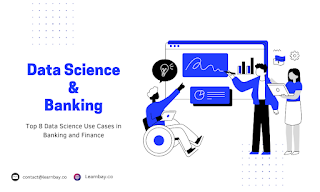How Crucial is Cloud Computing for Data Science?
Cloud Computing and Data Science are a savior for companies who want to improve their services to their customers. In addition to using data from outside sources, this firm also creates some data. Yet, the issue is how to make use of this information. After all, our little business isn't Facebook or Google! It lacks the equipment and funding to keep a significant volume of data on local servers for data processing.
Yet, are you curious as to how cloud computing fits into this? How does it affect data science? In this essay, we'll discuss that, but first, let's define cloud computing and also explore the data science course in Bangalore if you are a beginner.
Cloud computing: What is it?
By using the internet, or "cloud," which is what it is termed in this context, cloud computing enables businesses to access various computing services, including databases, servers, software, artificial intelligence, data analytics, etc. These businesses can afford to operate their applications in the top data centers around the globe.
This guarantees that ambitious and complicated initiatives that would otherwise be highly expensive may be used by small businesses or those in emerging nations. Also, this is true for the field of data science. Cloud computing has greatly simplified data analytics and data management for data scientists.
Importance of Cloud Computing in Data Science
Imagine a world without cloud computing for data science for a second. Then, businesses would have to keep data locally on servers, and if a data scientist needed to analyze the data or extract information from it, they would have to move it from the main servers to their system before starting their research.
Do you know how complicated this is? Businesses require vast volumes of data for their data analysis; thus, this is a sizable amount of data.
Also, building servers for the data is highly expensive, and while huge businesses can easily afford this, it is completely different for smaller businesses. Many smaller businesses cannot use servers since they need a place to store them.
In addition to ongoing maintenance and care, these servers also need backups if something goes wrong. Having servers also requires extensive planning, and depending on their data needs, businesses may end up with more or fewer servers than necessary.
In situations like this, cloud computing is useful. Businesses may host their data on the cloud and no longer worry about servers because the cloud provider is now responsible for them. Businesses may access server architecture in the cloud based on their requirements and even save money by only paying for the cloud data they use.
Data has been made accessible to everybody in a modern-day-unique way thanks to cloud computing. Smaller businesses may now use data analytics to compete with larger international corporations in the market without worrying about the exorbitant prices of data science. Data as a Service was created due to the popularity of Data Science with Cloud Computing nowadays (DaaS).
Data as a Service: What is it?
As cloud-based data services have grown in popularity, the idea of "Data as a Service" (DaaS) is also gaining popularity. Data vendors who employ cloud computing to offer data storage, processing, integration, and analytics services to businesses connected through a network provide DaaS.
As a result, businesses may utilize data as a service to understand their target market better, automate portions of their production, develop better goods in line with consumer demand, etc. A corporation gains an advantage over rivals thanks to all of these factors, boosting its profitability.
Data as a Service is comparable to Software as a Service, Infrastructure as a Service, Platform as a Service, etc., which are all well-known in the computer industry. DaaS is a relatively new concept, but it is just now gaining popularity as cloud computing usage in data science increases.
Yet, DaaS is becoming more and more popular since the fundamental cloud computing services offered by businesses at first were ill-prepared to manage the enormous data loads required by DaaS. Instead of managing data processing and analytics on such a massive scale, these services could only manage basic data storage.
Also, past network management of big data volumes was challenging due to the network's constrained capacity. Data as a Service has become extremely popular due to greater bandwidth and inexpensive cloud storage, albeit both factors have evolved.
It is predicted that by 2023, 90% of major firms will be using DaaS to create money from data. Even if a department in a large company lacks the internal data infrastructure to accomplish this task, data as a service will enable easy data sharing across departments and the acquisition of actionable insights. As a result, DaaS will enable data exchange for businesses to be much simpler and faster in real-time, increasing a company's profitability.
Data Science Cloud Computing Platforms
Amazon Web Services
A division of Amazon, Amazon Web Services(AWS) is a cloud computing platform. Being one of the most widely used cloud computing platforms for data science, AWS was introduced in 2006. Amazon Web Services (AWS) offers some solutions for data analytics, including Amazon QuickSight (business analytics service), Amazon RedShift (data warehousing), AWS Data Pipeline, AWS Data Exchange, and Amazon Kinesis, among others are Amazon EMR (Big data processing).
Moreover, Amazon Web Services offers database-related products, such as Amazon Aurora (a relational database) and Amazon DynamoDB (NoSQL database). Several well-known businesses, such as Netflix, NASA, etc, use AWS.
Google Cloud
A cloud computing platform offered by Google is known as the Google Cloud Platform (GCP). It gives businesses access to the same infrastructure that Google uses for its internal products like Google Search, YouTube, Gmail, etc.
BigQuery (Data warehouse), Google Data Studio (Visualization Dashboards, Data Reporting), Looker (Business Intelligence Analytics), Dataflow (Streaming analytics), Dataproc (Running Apache Hadoop and Apache Spark clusters), and Dataprep (Data Preparation) are just a few of the data analytics products offered by Google Cloud.
Microsoft Azure
Microsoft built the cloud computing platform known as Azure. It is a well-liked cloud computing platform for data science and analytics and was first introduced in 2010. Azure Synapse Analytics (data analytics), Azure Stream Analytics (streaming analytics), Azure Databricks (Apache Spark analytics), Azure Data Lake Storage (data lake), Data Factory (hybrid data integration), etc., are some of the Microsoft Azure offerings for data analytics.
Databases supported by Microsoft Azure include Azure Cosmos DB (a NoSQL database), Azure SQL Database (a SQL database), and more.
Conclusion
To manage vast data operations, organizations and enterprises require a suitable and acceptable environment. Data science and cloud computing technologies work together in enterprises to improve value and performance. Equip yourself with data science technologies by learning with the best data science course in Pune available online, which is geared towards working professionals.




Comments
Post a Comment